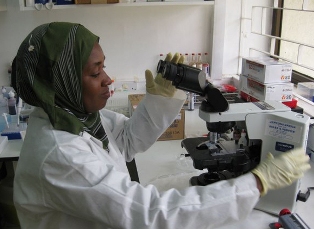
 |
| News & Outreach |
|
||||||
Global Health MattersNovember - December, 2008 | Volume 7, Issue 6
Tanzanians trained in culture of merit Farida Segesela was among the first group of Tanzanian biotechnology lab staff selected to participate in a short-term training opportunity, conducting work at the University of Virginia, rotating through hematology, microbiology, immunology, toxicology, molecular biology and point-of-care testing. Photo: Jenny Haliski A recent visit to the Kilimanjaro Christian Medical Centre's new biotechnology lab in Moshi, Tanzania, found trainees working on HIV and TB testing, bacteriology cultures and immunologic, microbiologic, hematologic and chemistry studies. The collaboration among the medical center and Duke University and the University of Virginia is part of Fogarty's signature AIDS International Training and Research Program, now 20 years old and its longest running. The program provides short-, medium- and long-term training opportunities for Tanzanian students, including training in the United States and at regional sites with sub-Saharan Africa. The application process highlighted a difference in the Tanzanian working culture compared to that of the United States. Seniority is often valued over merit. Not so in the AITRP application process; the person who came in second was the least senior of the group. Jean Gratz, the laboratory quality assurance coordinator, says the value of the Fogarty-backed experience is "They go for one month, they learn, they come back, and they teach their peers. It gives our site a boost, an infusion of energy." Among many challenges is coping with frequent power outages and surges, solvable ultimately by installing a generator and a voltage regulator. Principal Investigator Dr. John Crump of Duke says his goal is long term--to improve the operation over a period of decades. "Over that length of time, what staff can we train, what infrastructure can we establish, and what papers can we publish with data that will influence health policies? "Our goal is to give all aspects of the program into well-equiped Tanzanian hands. That's probably about 10 years away, and AITRP is of central importance in reaching that goal," Crump predicts. Jenny Haliski, reported from Moshi, Tanzania, for Global Health Matters.
Should you require Adobe Acrobat for viewing PDFs, current and free accessible plug-ins are available at the Adobe website.
|
|||||||
|